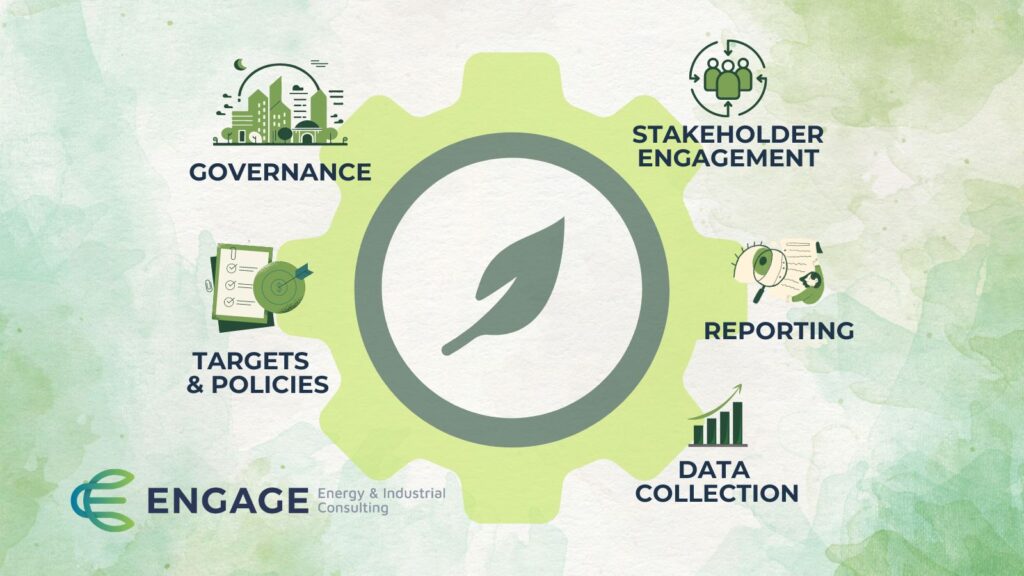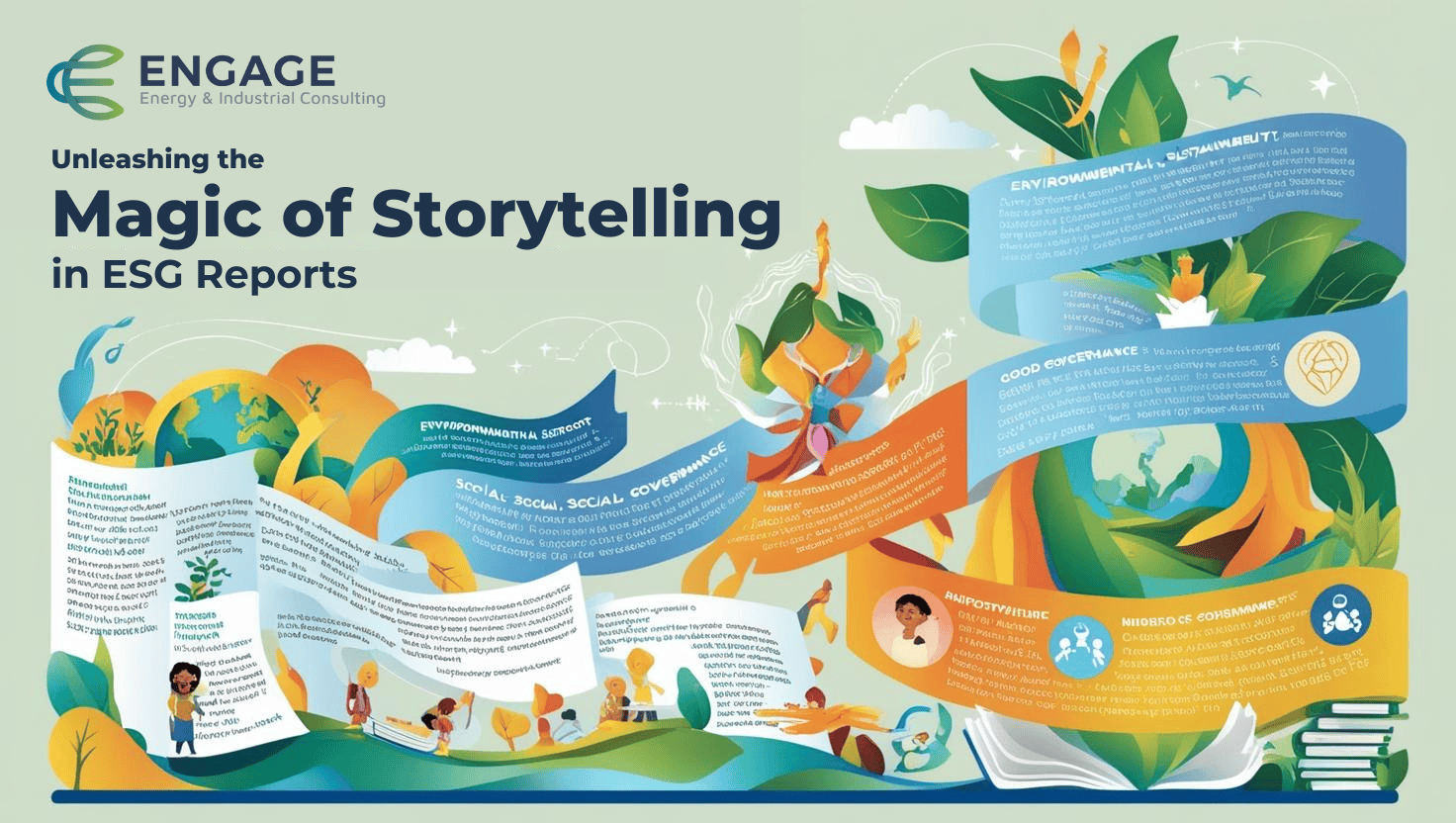Businesses both in the United States and in Europe continue to set their sights on EU ESG Reporting Requirements. Many U.S. Companies have plants overseas. Meeting European Climate Law requirements can be a challenge. That is where Engage Energy & Industrial Energy can help develop a plan to become compliant with EU ESG reporting requirements.
In this blog we are going to address the key points of European Union ESG Reporting requirements. We have been collaborating with companies in the European Union through this new regulatory period. Here are some of the things we have learned.
Why is the EU Requiring More Corporate Sustainability Reporting?
Today, EU law requires all large companies and all listed companies to work towards climate change resilience through tough new sustainability requirements. The goal is to help investors, civil society organizations, consumers, and other stakeholders to evaluate the sustainability performance of companies.
This is one of the biggest movements for Europe as part of the European Green Deal. A policy developed with a commitment to reduce the net greenhouse gas emissions by 55% or mor by 2030, compared to the levels recorded in the year 1990.
“One third of the €1.8 trillion investments from the NextGenerationEU Recovery Plan, and the EU’s seven-year budget will finance the European Green Deal.”
–European Commission
What is EU ESG Reporting?
EU ESG Reporting refers to the European Union’s efforts to standardize and strengthen Environmental, Social, and Governance (ESG) reporting by companies. The goal is to enhance transparency and comparability of ESG information provided by businesses, helping investors and stakeholders make informed decisions.
EU ESG Reporting requirements often include disclosing information on environmental impact, social practices, and corporate governance in a structured manner. This is part of the EU’s broader sustainability initiatives to promote responsible business practices and address climate change.
Steps to Be EU ESG Reporting Compliant.

To be compliant with EU ESG Reporting requirements, European companies typically need to follow these steps:
Governance
European businesses should familiarize themselves with the specific EU regulations and directives. Introducing ESG reporting that applies to its industry and size. EU countries should ensure that the risks and responsibilities are understood according to. All European businesses should focus on climate resilience between national, regional, and local levels. They should also develop a solid knowledge base and resources for environmental impact.
“Governance focuses on the ethics of a company regarding their corporate practices. In ESG, governance is often forgotten as many of those standards are set by existing laws and regulations. There have been attempts to raise its profile, however the environmental issues maintain most of the focus.”
–FORBES
Set Targets & Policies
Establish clear ESG targets, policies, and practices that align with regulatory requirements and international standards like the UN Sustainable Development Goals (SDGs). European Climate Commission assessed progress towards the climate neutrality and adaptation sustainable objectives in 2023. To meet the requirements of European Climate Law which has lofty goals of carbon neutrality by 2050.
The findings were published as part of the 2023 Climate Action Progress Report. In which, European companies must now adhere to new standards and prove that they are taking steps to do so.
Data Collection
EU ESG Reporting requires that businesses gather accurate data. What qualifies accurate and relevant data on ESG performance indicators? Things that data should be collected, include energy consumption, greenhouse gas emissions, diversity metrics, and ethical supply chain practices.
Report Transparently
European companies must be able to disclose ESG information in a structured and standardized format. This is a requirement by the EU ESG reporting directives. Reports should include things like annual reports, sustainability reports, or ESG disclosures.
In January 2024, the European Union’s Corporate Sustainability Reporting Directive (CSRD) gained significant attention since its passing in July 2023. The need for corporate responsibility is now a requirement for doing business in Europe.
“According to the official CSRD guidelines, approximately 50,000 large, medium, and small-sized companies in the E.U. will need to apply the CSRD rules starting between 2024 and 2029. Indeed, large companies or large groups with consolidated subsidiaries must meet two of these three criteria — €40 million in net turnover, €20 million in assets, or 250 or more employees. International companies with subsidiaries located in the E.U. will need to abide by the CSRD if they conduct significant operations there.”
– Thomson Reuters
Regular Engagement with Stakeholders
It is important to regularly Engage with stakeholders throughout the year and at every point in the EU ESG Reporting process. This includes stakeholders like your business’ investors, employees, customers, and communities, to communicate ESG efforts and address concerns.
What happens if US companies operating in European countries are not compliant with EU ESG Regulations?
If European companies are not compliant with EU Environmental, Social, and Governance (ESG) regulations. Today, there has been some pushback from European companies about the new regulations. Thus, there has been a delay for some of the requirements according to an article by Bloomberg (READ IT HERE.)
Corporate Sustainability Reporting directives CSRD also applies to EU companies and public and private non-EU companies that meet the threshold requirements. As a result, many US and other non-EU companies with EU business may be required to produce ESG reports in compliance with EU rules. It does not even matter if your company is not listed on a European exchange.
Engage Energy & Industrial Reporting Can Help Your Business with EU ESG Reporting.
Engage Energy & Industrial reporting is here to help your business with compliance in Europe for all ESG Reporting requirements. For many American based companies, understanding the requirements is a vital part of doing business in Europe today. We are pleased to work with several companies including TSG with EU ESG Reporting. Read the full TSG Report HERE.
For many companies implementing the required reporting for EU ESG will experience headaches around increased costs and complexity around global frameworks and standards. However, the need for this type of sustainability reporting is important to investors, and customers. This is the part of a global corporate responsibility to sustainability efforts.
You are not alone; we are here to help.
Our goal is to help you follow these steps, European companies can enhance their ESG reporting practices, demonstrate their commitment to sustainability, and meet regulatory requirements set by the European Union. Together we can make a significant impact on climate change.
Contact us to learn more.





